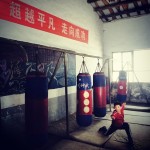It’s been a while, again, so I will get right to it.
I want to talk about a man named Ren Gang, the Party Secretary of the Sichuan Provincial Wushu Association. As such, he holds sway over all things martial in Sichuan. Wushu performances and training, allocation of belts, degrees and titles, approval of new schools and temples, any martial events – including fights – and, in general, the direction of wushu itself in this province.
The first time I spoke to him, I made a trip out to Dujiangyan by high speed rail specifically to talk to him. He was busy coaching the Sichuan Provincial Wushu Team in a closed door session, and came out for dinner. He was waiting for me by the back gate of the gym, besides his eggshell white BMW. We walked across the street, gauging each other and small-talking about Sichuan food.
Ren Gang holds himself like a martial artist. He stands up straight, swaggers slightly, and has a reserve of energy dozing beneath a pressed white polo shirt and pressed black pants. His hair is thinning, but his eyes are sharp and I felt them analyze my movements, my speech, the way I held myself and, after he demanded a demonstration, the weakness in my horse stance.
Ren speaks his mind without fear, because not only does he sit atop the Sichuan martial arts world, but he is also somewhat of a legend. Most people who know him speak of him with a mixture of envy, reverence, and fear. My own master, Li Quan, was shocked to know that I had dinner with THE Ren Gang, the man whose 1983 film, Little Heroes, influenced an entire generation of martial artists. A member of the very first group of official wushu practitioners to emerge out of the Cultural Revolution with the mandate to re-introduce, re-discover and revive the ancient art.
The MAN in Sichuan, when it comes to wushu, gongfu and sanda.






